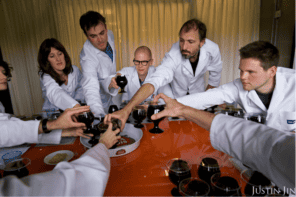It was 30 years ago this month that Tim Berners-Lee, then a physicist-turned-computer-scientist at CERN, published a document entitled “Information management: a proposal”. The document described a way to let the thousands of scientists at the lab keep track of all the information needed to build and operate the upcoming Large Hadron Collider. Envisaging the use of hypertext to link documents, Berners-Lee’s proposal was the birth of what became the World Wide Web.
This month you can celebrate the 30th annivesrary of the Web with a special issue of Physics World magazine. In the cover feature of the 80-page issue, which you can also read here, Neil Johnson from George Washington University in the US describes how physics can help in the battle against terrorism, by tracking the birth, growth and death of extremist groups who have gathered together online through social media. The video above provides an overview of the feature.

Elsewhere in the issue, you can find out how machine learning and artificial intelligence are affecting physics – from statistical and medical physics to quantum and materials science. There’s also a great feature on how computing and simulation have evolved into the “third pillar” of science alongside theory and experiment. Problem is, too many physicists insist on developing their own software from scratch, despite not always being the best coders in the world. Plus, they love to redeploy successful software for new applications, leading to code that quickly gets bloated and inefficient.
For a bit of fun, try our special Internet and Web-themed cryptic crossword and take a peek at a special, two-page graphic by Jess Wade outlining the history of the Web. If you don’t get all her references, you’ll just have to look them up – on the Web. And if you fancy a career of your own in computing, software or IT, check out what Federico Carminati, from CERN’s openlab, has to say.
You can enjoy the January 2019 issue of Physics World magazine via our digital apps for iOS, Android and Web browsers. (membership of the Institute of Physics required). Let us know what you think about the issue on Twitter, Facebook or by e-mailing us at pwld@iop.org.
For the record, here’s a run-down of what’s in the issue.
• Hi-tech firms seek clarity amid Brexit confusion – As the UK prepares to leave the European Union this month, leaders of Britain’s industrial-physics community are eyeing up their options. Margaret Harris reports
• Vague but exciting – James McKenzie reflects on how the World Wide Web has transformed every aspect of our lives since its creation at CERN 30 years ago
• A frame of mind – An ongoing debate in artificialintelligence research reveals productive interactions between cognitive scientists and philosophers, says Robert P Crease
• Out of the margins – Janice Hudgings and Chaelee Dalton describe how integrating pro-equity material into a standard physics curriculum can improve the learning experience of students from under-represented groups
• The dark side of social media – Social media can bring people together for good, but it can also connect supporters of terror, extremism and hate. Neil Johnson shows how physics can shed light on this darker side of our online world
• The third pillar – Computing has quickly evolved to become the third “pillar” of science. But to reap its true rewards, researchers need software code that is flexible and can be easily adapted to meet new needs, as Benjamin Skuse finds out
• A learning revolution – The groundwork for machine learning was laid down in the middle of last century. But increasingly powerful computers – harnessed to algorithms refined over the past decade – are driving an explosion of applications in everything from medical physics to materials, as Marric Stephens discovers
• Life, the universe and everything – Writer, broadcaster and physicist Paul Davies‘ latest book grapples with the laws that govern the emergence of life. Tushna Commissariat reviews The Demon in the Machine and questions Davies about the science and the motivations behind his new work
• What has the Earth ever done for us? – Ian Randall reviews Origins: How the Earth Made Us by Lewis Dartnell
• Particles of the future – Federico Carminati, computerphysicist at CERN openlab, talks to Tushna Commissariat about career opportunities in highenergy physics and computing
• Cyberspace cryptic crossword – As part of the World Wide Web’s tricennial celebrations, put your wetware processors through their paces with this Internet-and-computer-themed cryptic crossword compiled by Ian Randall



